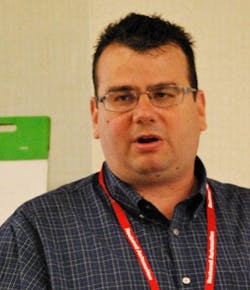Monin flavors western hemisphere with FactoryTalk Batch
Monin makes more than 200 mostly sugar-based, bottled syrups that enhance the taste of dishes created in about 45,000 restaurants in 22 countries from the U.S. to Argentina. The company planned to achieve maximum production capacity in 20 years; instead, the Clearwater facility hit this mark in 10 years—between 1996 and about 2006. Monin's process engineers and managers knew this meant they had to take drastic action, update from their traditionally manual batching procedures, and automate their numerous recipes and procedures—hopefully in compliance with the widely accepted ISA S88 standard ISA S95 model.
Consequently, the Clearwater plant began its batch upgrade in 2011 and worked with system integrator Altra Systems in Orlando, Fla., to help carry out the project. In general, Monin's update integrated plant-floor and enterprise information and implemented FactoryTalk Batch, PhaseManager, PlantPAx Library of Process Objects and other software and devices from Rockwell Automation to improve Monin's recipe formation and management, and then integrate them seamlessly with its Navision enterprise resource planning (ERP) system.
See also: Learn about FactoryTalk Batch
"Previously, Monin mixed flavors and gave orders on paper, but now it had to develop a new batch system to satisfy its new demand levels," said Armando Di Francesco, technical manager at Altra Systems. "The Clearwater plant has three main batching tanks, but it only has one batching line, and so it was critical for it to be replaced properly with a whole new system. Also, the new batching system had to be integrated with Monin's existing Navision ERP system from Microsoft, where it stores all its recipes. To make the best possible products, Monin does continuous, daily quality checks, but they wanted to reduce their time and programming costs."Of the three tanks, one is used as a shared-resource, small-ingredient tank. This tank moves ingredients through a 400-liter-per-hour (LPH) pasteurizer and sends them to three main finished-goods holding tanks. The production system includes multiple valve clusters, variable-frequency drives (VFDs), mass flowmeters and other components, which all communicate via EtherNet/IP communication protocol. The system also includes Mettler Toledo's EtherNet/IP-enabled scales.
Di Francesco presented "Monin Increases Production and Achieves S95 Standard on Path to The Connected Enterprise" on the first day of Rockwell Automation TechED at the Manchester Hyatt Hotel in San Diego.
To begin their batch upgrade, Di Francesco says Monin and Altra recruited a project team and made sure it include everyone at the Clearwater plant, especially from the factory-floor and the IT department. This team defined upgrade specifics, so everyone was clear on what it would include and how the update would combine many formerly separate process control and IT responsibilities.
"The future for Monin is completely integrated manufacturing, and so IT and process control must be joined together," explains Di Francesco. "This why we picked the Rockwell Automation solutions for following the S88 standard and S95 model, and being able to do it right out of the box."
"PlantPAx software objects gave us many tools that we needed, gave us control modules for us process, and still saved us about 30-50% on the engineering and programming hours we would have been required to spend otherwise," says Armando Di Francesco, technical manager at system integrator Altra Systems.
Consequently, Monin and Altra implemented FactoryTalk Batch with multiple thin clients throughout the Clearwater plant, and it successfully communicated with the Navision ERP system. This solution also included Rockwell Software FactoryTalk View SE, FactoryTalk eProcedure and PhaseManager software, as well as the PlantPAx Library of Process Objects, ControlLogix PLCs and virtualized servers.
"The PlantPAx software objects gave us many tools that we needed. It gave us control modules for our process and still saved us 30-50% on the engineering and programming hours we would have been required to spend otherwise," added Di Francesco. "PhaseManager is what we used to integrate the ControlLogix PLCs with FactoryTalk. It simplified our phase programming and also reduced the time needed to develop phase-templates for common tasks, such as agitating, mixing and adding ingredients.
"These six or seven templates are stored in the FactoryTalk Batch server, where they can be filled with data from our 200 recipes. If we need to change recipes or add new ones, it's very easy now, and we even have eSignatures for different operations to check who did what and comply with electronic batch record (EBR) requirements. FactoryTalk Batch and Navision also allow the plant manager to schedule all his batches for the coming week and keep two days of production recipes ready to go. Once the operators complete a batch, then all of its documentation can be easily uploaded."
Di Francesco reported the Clearwater plant's upgrade took only 48 hours to replace its batch system, and it was running at full speed just one week later, even though its recipes in Navision were unchanged. Because the plant no longer uses paper recipes and orders, he added that it's also reduced operator error to close to zero.
"We've also reduced time to market, increased batch consistency, and reduced time and paperwork to execute testing," added Di Francesco. "In the future, Monin plans to work on migrating to FactoryTalk Batch v12, integrate a major Navision upgrade, and move to virtualize even more computing on a cloud-based data center."




